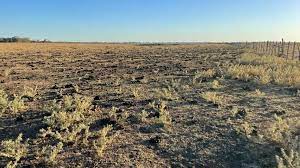In the midst of the worst drought that Argentina has had in sixty years, which has devastated soy, corn, and wheat crops and decimated cow herds, rancher Andrés Betiger is battling to keep his property from going under in the Argentine town of Ciguena.
A reflection of how the dry weather since last year has affected farmers, who have delayed planting and even abandoned crops, Betiger drives 52 kilometers (32 miles) to fetch water with a tank and a decrepit tractor that frequently breaks down.
“The situation is dire; we have little and no margin to halt events for four or five days. Practically every day, we haul water for the animals to drink “said Betiger, 41, who is thinking of filing for bankruptcy.
He said, “That aches and it worries me.” It already threatens to become physically and financially unsustainable.
Argentina’s drought has had a significant impact on the world’s food markets, pushing farmers to reduce harvest expectations and reducing the supply of grains from the No. 3 corn exporter, a significant producer of wheat, and a country that supplies a lot of cattle and soy oil.
In turn, this hinders Argentina’s ability to accumulate crucial dollar reserves, endangering a shaky economic recovery and leaving the government unable to make debt repayments amid increasing inflation and a significant fiscal deficit.
The drought situation in Argentina has “produced a perfect storm,” according to Cristian Russo, head of agricultural estimates at the Rosario grains market, which this month revised its soybean harvest estimate to the lowest level in 14 years.
He said that the effects of the drought, which are associated with a third consecutive La Nina weather pattern, could potentially worsen and cause significant reductions in the prognosis for soy and corn. Drought has already reduced the wheat crop by half.
Russo added that the crop was shaping up to be the worst in 20 years and that there were additional reasons to be pessimistic and believe that the figures would keep falling.
“It will be a crisis unlike anything we’ve ever seen.” That suggests that numerous producers will file for bankruptcy.”
$BILLION IN LOSSES
Gustavo Giailevra lifts the head of a pregnant cow that is motionless in a sweltering Sante Fe pasture, coaxing it to drink. Although he doesn’t believe she will live, he nevertheless wants her to die a “good death.”
Giailevra, a farmer who has already endured catastrophic droughts, has seen his livelihood severely impacted over the past year. Due to the severe lack of rain, he has lost the majority of his cotton and maize harvests in addition to one-third of his 900 head of cattle.
“The calves’ final cries may be heard.” It is awful. On his farm, where the water reservoirs he had excavated are all dry, the 63-year-old told reporters that he must carry what little water he can by truck.
Many local farmers claim they lost early-sown maize, wheat, and soy; as a result, they have planted more fields with drought-resistant cotton in an effort to recover lost income. Numerous cattle have been lost, which poses a threat to the supply of beef and a price increase.
Although it has limited resources due to the impoverished state coffers, the government has implemented certain tax relief measures for farmers. Farmers contacted claimed the actions were only “patches.”
The effects of the drought were evident all throughout the area visited.
The neighboring town of Vera’s El Bonete lagoon and the animals that resided there have both completely disappeared. One village had been without mains water for more than a month.
According to Julio Calzada, chief of economic research at the Rosario exchange, the drought may cost producers as much as $10.5 billion, primarily as a result of a drop in exports.
He added that this would result in an approximate $8 billion loss in exports for Argentina and a loss of $3.5 billion in government revenue, damaging already low levels of currency reserves.
“Income from rural areas is important to the national economy,” he remarked. “This (the drought) is the biggest economic issue,


















